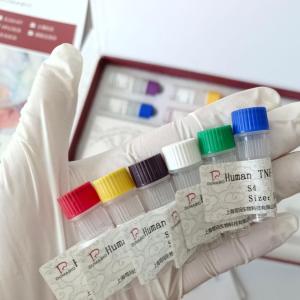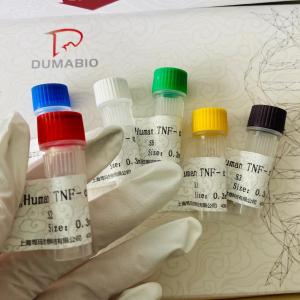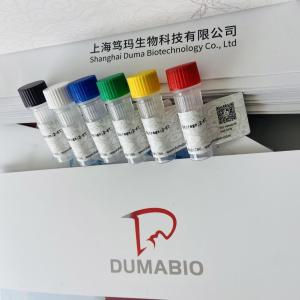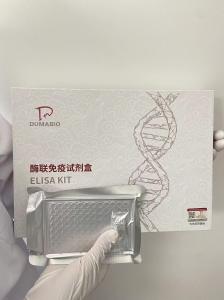
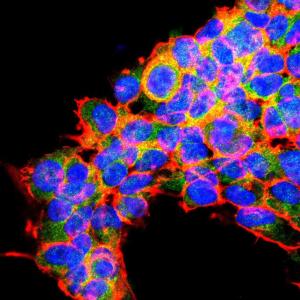
|
- 品牌:OminimAbs
- 产地:上海
- 型号:毫升
- 货号:OM641708
- 发布日期: 2024-09-02
- 更新日期: 2024-10-09
| 产地 | 上海 |
| 品牌 | OminimAbs |
| 保存条件 | |
| 货号 | OM641708 |
| 用途 | 实验研究 |
| 应用范围 | 科研实验 |
| 抗原来源 | 电询 |
| 保质期 | 2年 |
| 抗体名 | 电询 |
| 是否单克隆 | 否 |
| 克隆性 | 否 |
| 靶点 | 电询 |
| 适应物种 | 电询 |
| 形态 | 电询 |
| 宿主 | 电询 |
| 标记物 | 电询 |
| 包装规格 | 毫升 |
| 亚型 | 电询 |
| 标识物 | 电询 |
| 浓度 | 电询% |
| 免疫原 | 电询 |
| 是否进口 | 否 |
Product Profile
Product Name
Anti-P63 antibody
Antibody Type
Primary Antibodies
Immunogen
Polypeptide
Key Feature
Clonality
Polyclonal
Isotype
IgG
Host Species
Rabbit
Tested
Application
ELISAWB
WB:1:200-1:2000
Species
Reactivity
HumanMouseRat
Concentration
1 mg/ml
Purification
Protein A
Target Information
Gene Symbol
TP63
Gene Synonyms
AIS
KET
LMS
NBP
RHS
p40
p51
p63
EEC3
OFC8
p73H
p73L
SHFM4
TP53L
TP73L
p53CP
TP53CP
B(p51A)
B(p51B)
Hide
Gene Full Name
tumor protein p63
Gene Summary
This gene encodes a member of the p53
family of transcription factors. The functional domains of p53 family
proteins include an N-terminal transactivation domain, a central DNA-binding
domain and an oligomerization domain. Alternative splicing of this gene and
the use of alternative promoters results in multiple transcript variants
encoding different isoforms that vary in their functional properties. These
isoforms function during skin development and maintenance, adult
stem/progenitor cell regulation, heart development and premature aging. Some
isoforms have been found to protect the germline by eliminating oocytes or
testicular germ cells that have suffered DNA damage. Mutations in this gene
are associated with ectodermal dysplasia, and cleft lip/palate syndrome 3
(EEC3); split-hand/foot malformation 4 (SHFM4); ankyloblepharon-ectodermal
defects-cleft lip/palate; ADULT syndrome (acro-dermato-ungual-lacrimal-tooth);
limb-mammary syndrome; Rap-Hodgkin syndrome (RHS); and orofacial cleft 8.
[provided by RefSeq, Aug 2016]
Hide
Molecular
Weight(MW)
77 kDa
Cellular
Localizatio
Nucleus
Application
· 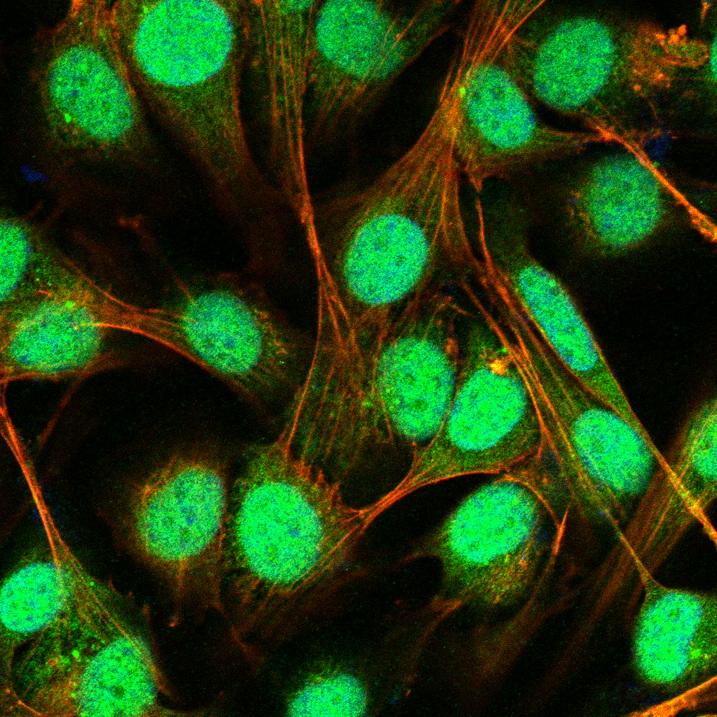
WB
Western blot
analysis using P63 antibody against A431(1), HEK293(2) cell lysate.
Application
Notes
WB:1:200-1:2000
Additional Information
Form
Liquid
Storage
Instruction
Shipped at 4°C. Store at +4°C short term
(1-2 weeks). Store at -20°C long term. Avoid freeze / thaw cycle.
Storage Buffer
Purified antibody in PBS with 0.05%
sodium azide.
Product Profile
Product Name
Anti-P63 antibody
Antibody Type
Primary Antibodies
Immunogen
Polypeptide
Key Feature
Clonality
Polyclonal
Isotype
IgG
Host Species
Rabbit
Tested
Application
ELISAWB
WB:1:200-1:2000
Species
Reactivity
HumanMouseRat
Concentration
1 mg/ml
Purification
Protein A
Target Information
Gene Symbol
TP63
Gene Synonyms
AIS
KET
LMS
NBP
RHS
p40
p51
p63
EEC3
OFC8
p73H
p73L
SHFM4
TP53L
TP73L
p53CP
TP53CP
B(p51A)
B(p51B)
Hide
Gene Full Name
tumor protein p63
Gene Summary
This gene encodes a member of the p53
family of transcription factors. The functional domains of p53 family
proteins include an N-terminal transactivation domain, a central DNA-binding
domain and an oligomerization domain. Alternative splicing of this gene and
the use of alternative promoters results in multiple transcript variants
encoding different isoforms that vary in their functional properties. These
isoforms function during skin development and maintenance, adult
stem/progenitor cell regulation, heart development and premature aging. Some
isoforms have been found to protect the germline by eliminating oocytes or
testicular germ cells that have suffered DNA damage. Mutations in this gene
are associated with ectodermal dysplasia, and cleft lip/palate syndrome 3
(EEC3); split-hand/foot malformation 4 (SHFM4); ankyloblepharon-ectodermal
defects-cleft lip/palate; ADULT syndrome (acro-dermato-ungual-lacrimal-tooth);
limb-mammary syndrome; Rap-Hodgkin syndrome (RHS); and orofacial cleft 8.
[provided by RefSeq, Aug 2016]
Hide
Molecular
Weight(MW)
77 kDa
Cellular
Localizatio
Nucleus
Application
· 
WB
Western blot
analysis using P63 antibody against A431(1), HEK293(2) cell lysate.
Application
Notes
WB:1:200-1:2000
Additional Information
Form
Liquid
Storage
Instruction
Shipped at 4°C. Store at +4°C short term
(1-2 weeks). Store at -20°C long term. Avoid freeze / thaw cycle.
Storage Buffer
Purified antibody in PBS with 0.05%
sodium azide.
Product Profile
Product Name
Anti-P63 antibody
Antibody Type
Primary Antibodies
Immunogen
Polypeptide
Key Feature
Clonality
Polyclonal
Isotype
IgG
Host Species
Rabbit
Tested
Application
ELISAWB
WB:1:200-1:2000
Species
Reactivity
HumanMouseRat
Concentration
1 mg/ml
Purification
Protein A
Target Information
Gene Symbol
TP63
Gene Synonyms
AIS
KET
LMS
NBP
RHS
p40
p51
p63
EEC3
OFC8
p73H
p73L
SHFM4
TP53L
TP73L
p53CP
TP53CP
B(p51A)
B(p51B)
Hide
Gene Full Name
tumor protein p63
Gene Summary
This gene encodes a member of the p53
family of transcription factors. The functional domains of p53 family
proteins include an N-terminal transactivation domain, a central DNA-binding
domain and an oligomerization domain. Alternative splicing of this gene and
the use of alternative promoters results in multiple transcript variants
encoding different isoforms that vary in their functional properties. These
isoforms function during skin development and maintenance, adult
stem/progenitor cell regulation, heart development and premature aging. Some
isoforms have been found to protect the germline by eliminating oocytes or
testicular germ cells that have suffered DNA damage. Mutations in this gene
are associated with ectodermal dysplasia, and cleft lip/palate syndrome 3
(EEC3); split-hand/foot malformation 4 (SHFM4); ankyloblepharon-ectodermal
defects-cleft lip/palate; ADULT syndrome (acro-dermato-ungual-lacrimal-tooth);
limb-mammary syndrome; Rap-Hodgkin syndrome (RHS); and orofacial cleft 8.
[provided by RefSeq, Aug 2016]
Hide
Molecular
Weight(MW)
77 kDa
Cellular
Localizatio
Nucleus
Application
· 
WB
Western blot
analysis using P63 antibody against A431(1), HEK293(2) cell lysate.
Application
Notes
WB:1:200-1:2000
Additional Information
Form
Liquid
Storage
Instruction
Shipped at 4°C. Store at +4°C short term
(1-2 weeks). Store at -20°C long term. Avoid freeze / thaw cycle.
Storage Buffer
Purified antibody in PBS with 0.05%
sodium azide.
Product Profile
Product Name
Anti-P63 antibody
Antibody Type
Primary Antibodies
Immunogen
Polypeptide
Key Feature
Clonality
Polyclonal
Isotype
IgG
Host Species
Rabbit
Tested
Application
ELISAWB
WB:1:200-1:2000
Species
Reactivity
HumanMouseRat
Concentration
1 mg/ml
Purification
Protein A
Target Information
Gene Symbol
TP63
Gene Synonyms
AIS
KET
LMS
NBP
RHS
p40
p51
p63
EEC3
OFC8
p73H
p73L
SHFM4
TP53L
TP73L
p53CP
TP53CP
B(p51A)
B(p51B)
Hide
Gene Full Name
tumor protein p63
Gene Summary
This gene encodes a member of the p53
family of transcription factors. The functional domains of p53 family
proteins include an N-terminal transactivation domain, a central DNA-binding
domain and an oligomerization domain. Alternative splicing of this gene and
the use of alternative promoters results in multiple transcript variants
encoding different isoforms that vary in their functional properties. These
isoforms function during skin development and maintenance, adult
stem/progenitor cell regulation, heart development and premature aging. Some
isoforms have been found to protect the germline by eliminating oocytes or
testicular germ cells that have suffered DNA damage. Mutations in this gene
are associated with ectodermal dysplasia, and cleft lip/palate syndrome 3
(EEC3); split-hand/foot malformation 4 (SHFM4); ankyloblepharon-ectodermal
defects-cleft lip/palate; ADULT syndrome (acro-dermato-ungual-lacrimal-tooth);
limb-mammary syndrome; Rap-Hodgkin syndrome (RHS); and orofacial cleft 8.
[provided by RefSeq, Aug 2016]
Hide
Molecular
Weight(MW)
77 kDa
Cellular
Localizatio
Nucleus
Application
· 
WB
Western blot
analysis using P63 antibody against A431(1), HEK293(2) cell lysate.
Application
Notes
WB:1:200-1:2000
Additional Information
Form
Liquid
Storage
Instruction
Shipped at 4°C. Store at +4°C short term
(1-2 weeks). Store at -20°C long term. Avoid freeze / thaw cycle.
Storage Buffer
Purified antibody in PBS with 0.05%
sodium azide.
Product Profile
Product Name
Anti-P63 antibody
Antibody Type
Primary Antibodies
Immunogen
Polypeptide
Key Feature
Clonality
Polyclonal
Isotype
IgG
Host Species
Rabbit
Tested
Application
ELISAWB
WB:1:200-1:2000
Species
Reactivity
HumanMouseRat
Concentration
1 mg/ml
Purification
Protein A
Target Information
Gene Symbol
TP63
Gene Synonyms
AIS
KET
LMS
NBP
RHS
p40
p51
p63
EEC3
OFC8
p73H
p73L
SHFM4
TP53L
TP73L
p53CP
TP53CP
B(p51A)
B(p51B)
Hide
Gene Full Name
tumor protein p63
Gene Summary
This gene encodes a member of the p53
family of transcription factors. The functional domains of p53 family
proteins include an N-terminal transactivation domain, a central DNA-binding
domain and an oligomerization domain. Alternative splicing of this gene and
the use of alternative promoters results in multiple transcript variants
encoding different isoforms that vary in their functional properties. These
isoforms function during skin development and maintenance, adult
stem/progenitor cell regulation, heart development and premature aging. Some
isoforms have been found to protect the germline by eliminating oocytes or
testicular germ cells that have suffered DNA damage. Mutations in this gene
are associated with ectodermal dysplasia, and cleft lip/palate syndrome 3
(EEC3); split-hand/foot malformation 4 (SHFM4); ankyloblepharon-ectodermal
defects-cleft lip/palate; ADULT syndrome (acro-dermato-ungual-lacrimal-tooth);
limb-mammary syndrome; Rap-Hodgkin syndrome (RHS); and orofacial cleft 8.
[provided by RefSeq, Aug 2016]
Hide
Molecular
Weight(MW)
77 kDa
Cellular
Localizatio
Nucleus
Application
· 
WB
Western blot
analysis using P63 antibody against A431(1), HEK293(2) cell lysate.
Application
Notes
WB:1:200-1:2000
Additional Information
Form
Liquid
Storage
Instruction
Shipped at 4°C. Store at +4°C short term
(1-2 weeks). Store at -20°C long term. Avoid freeze / thaw cycle.
Storage Buffer
Purified antibody in PBS with 0.05%
sodium azide.
Product Profile
Product Name
Anti-P63 antibody
Antibody Type
Primary Antibodies
Immunogen
Polypeptide
Key Feature
Clonality
Polyclonal
Isotype
IgG
Host Species
Rabbit
Tested
Application
ELISAWB
WB:1:200-1:2000
Species
Reactivity
HumanMouseRat
Concentration
1 mg/ml
Purification
Protein A
Target Information
Gene Symbol
TP63
Gene Synonyms
AIS
KET
LMS
NBP
RHS
p40
p51
p63
EEC3
OFC8
p73H
p73L
SHFM4
TP53L
TP73L
p53CP
TP53CP
B(p51A)
B(p51B)
Hide
Gene Full Name
tumor protein p63
Gene Summary
This gene encodes a member of the p53
family of transcription factors. The functional domains of p53 family
proteins include an N-terminal transactivation domain, a central DNA-binding
domain and an oligomerization domain. Alternative splicing of this gene and
the use of alternative promoters results in multiple transcript variants
encoding different isoforms that vary in their functional properties. These
isoforms function during skin development and maintenance, adult
stem/progenitor cell regulation, heart development and premature aging. Some
isoforms have been found to protect the germline by eliminating oocytes or
testicular germ cells that have suffered DNA damage. Mutations in this gene
are associated with ectodermal dysplasia, and cleft lip/palate syndrome 3
(EEC3); split-hand/foot malformation 4 (SHFM4); ankyloblepharon-ectodermal
defects-cleft lip/palate; ADULT syndrome (acro-dermato-ungual-lacrimal-tooth);
limb-mammary syndrome; Rap-Hodgkin syndrome (RHS); and orofacial cleft 8.
[provided by RefSeq, Aug 2016]
Hide
Molecular
Weight(MW)
77 kDa
Cellular
Localizatio
Nucleus
Application
· 
WB
Western blot
analysis using P63 antibody against A431(1), HEK293(2) cell lysate.
Application
Notes
WB:1:200-1:2000
Additional Information
Form
Liquid
Storage
Instruction
Shipped at 4°C. Store at +4°C short term
(1-2 weeks). Store at -20°C long term. Avoid freeze / thaw cycle.
Storage Buffer
Purified antibody in PBS with 0.05%
sodium azide.
Product Profile
Product Name
Anti-P63 antibody
Antibody Type
Primary Antibodies
Immunogen
Polypeptide
Key Feature
Clonality
Polyclonal
Isotype
IgG
Host Species
Rabbit
Tested
Application
ELISAWB
WB:1:200-1:2000
Species
Reactivity
HumanMouseRat
Concentration
1 mg/ml
Purification
Protein A
Target Information
Gene Symbol
TP63
Gene Synonyms
AIS
KET
LMS
NBP
RHS
p40
p51
p63
EEC3
OFC8
p73H
p73L
SHFM4
TP53L
TP73L
p53CP
TP53CP
B(p51A)
B(p51B)
Hide
Gene Full Name
tumor protein p63
Gene Summary
This gene encodes a member of the p53
family of transcription factors. The functional domains of p53 family
proteins include an N-terminal transactivation domain, a central DNA-binding
domain and an oligomerization domain. Alternative splicing of this gene and
the use of alternative promoters results in multiple transcript variants
encoding different isoforms that vary in their functional properties. These
isoforms function during skin development and maintenance, adult
stem/progenitor cell regulation, heart development and premature aging. Some
isoforms have been found to protect the germline by eliminating oocytes or
testicular germ cells that have suffered DNA damage. Mutations in this gene
are associated with ectodermal dysplasia, and cleft lip/palate syndrome 3
(EEC3); split-hand/foot malformation 4 (SHFM4); ankyloblepharon-ectodermal
defects-cleft lip/palate; ADULT syndrome (acro-dermato-ungual-lacrimal-tooth);
limb-mammary syndrome; Rap-Hodgkin syndrome (RHS); and orofacial cleft 8.
[provided by RefSeq, Aug 2016]
Hide
Molecular
Weight(MW)
77 kDa
Cellular
Localizatio
Nucleus
Application
· 
WB
Western blot
analysis using P63 antibody against A431(1), HEK293(2) cell lysate.
Application
Notes
WB:1:200-1:2000
Additional Information
Form
Liquid
Storage
Instruction
Shipped at 4°C. Store at +4°C short term
(1-2 weeks). Store at -20°C long term. Avoid freeze / thaw cycle.
Storage Buffer
Purified antibody in PBS with 0.05%
sodium azide.
Product Profile
Product Name
Anti-P63 antibody
Antibody Type
Primary Antibodies
Immunogen
Polypeptide
Key Feature
Clonality
Polyclonal
Isotype
IgG
Host Species
Rabbit
Tested
Application
ELISAWB
WB:1:200-1:2000
Species
Reactivity
HumanMouseRat
Concentration
1 mg/ml
Purification
Protein A
Target Information
Gene Symbol
TP63
Gene Synonyms
AIS
KET
LMS
NBP
RHS
p40
p51
p63
EEC3
OFC8
p73H
p73L
SHFM4
TP53L
TP73L
p53CP
TP53CP
B(p51A)
B(p51B)
Hide
Gene Full Name
tumor protein p63
Gene Summary
This gene encodes a member of the p53
family of transcription factors. The functional domains of p53 family
proteins include an N-terminal transactivation domain, a central DNA-binding
domain and an oligomerization domain. Alternative splicing of this gene and
the use of alternative promoters results in multiple transcript variants
encoding different isoforms that vary in their functional properties. These
isoforms function during skin development and maintenance, adult
stem/progenitor cell regulation, heart development and premature aging. Some
isoforms have been found to protect the germline by eliminating oocytes or
testicular germ cells that have suffered DNA damage. Mutations in this gene
are associated with ectodermal dysplasia, and cleft lip/palate syndrome 3
(EEC3); split-hand/foot malformation 4 (SHFM4); ankyloblepharon-ectodermal
defects-cleft lip/palate; ADULT syndrome (acro-dermato-ungual-lacrimal-tooth);
limb-mammary syndrome; Rap-Hodgkin syndrome (RHS); and orofacial cleft 8.
[provided by RefSeq, Aug 2016]
Hide
Molecular
Weight(MW)
77 kDa
Cellular
Localizatio
Nucleus
Application
· 
WB
Western blot
analysis using P63 antibody against A431(1), HEK293(2) cell lysate.
Application
Notes
WB:1:200-1:2000
Additional Information
Form
Liquid
Storage
Instruction
Shipped at 4°C. Store at +4°C short term
(1-2 weeks). Store at -20°C long term. Avoid freeze / thaw cycle.
Storage Buffer
Purified antibody in PBS with 0.05%
sodium azide.
Product Profile
Product Name
Anti-P63 antibody
Antibody Type
Primary Antibodies
Immunogen
Polypeptide
Key Feature
Clonality
Polyclonal
Isotype
IgG
Host Species
Rabbit
Tested
Application
ELISAWB
WB:1:200-1:2000
Species
Reactivity
HumanMouseRat
Concentration
1 mg/ml
Purification
Protein A
Target Information
Gene Symbol
TP63
Gene Synonyms
AIS
KET
LMS
NBP
RHS
p40
p51
p63
EEC3
OFC8
p73H
p73L
SHFM4
TP53L
TP73L
p53CP
TP53CP
B(p51A)
B(p51B)
Hide
Gene Full Name
tumor protein p63
Gene Summary
This gene encodes a member of the p53
family of transcription factors. The functional domains of p53 family
proteins include an N-terminal transactivation domain, a central DNA-binding
domain and an oligomerization domain. Alternative splicing of this gene and
the use of alternative promoters results in multiple transcript variants
encoding different isoforms that vary in their functional properties. These
isoforms function during skin development and maintenance, adult
stem/progenitor cell regulation, heart development and premature aging. Some
isoforms have been found to protect the germline by eliminating oocytes or
testicular germ cells that have suffered DNA damage. Mutations in this gene
are associated with ectodermal dysplasia, and cleft lip/palate syndrome 3
(EEC3); split-hand/foot malformation 4 (SHFM4); ankyloblepharon-ectodermal
defects-cleft lip/palate; ADULT syndrome (acro-dermato-ungual-lacrimal-tooth);
limb-mammary syndrome; Rap-Hodgkin syndrome (RHS); and orofacial cleft 8.
[provided by RefSeq, Aug 2016]
Hide
Molecular
Weight(MW)
77 kDa
Cellular
Localizatio
Nucleus
Application
· 
WB
Western blot
analysis using P63 antibody against A431(1), HEK293(2) cell lysate.
Application
Notes
WB:1:200-1:2000
Additional Information
Form
Liquid
Storage
Instruction
Shipped at 4°C. Store at +4°C short term
(1-2 weeks). Store at -20°C long term. Avoid freeze / thaw cycle.
Storage Buffer
Purified antibody in PBS with 0.05%
sodium azide.
Product Profile
Product Name
Anti-P63 antibody
Antibody Type
Primary Antibodies
Immunogen
Polypeptide
Key Feature
Clonality
Polyclonal
Isotype
IgG
Host Species
Rabbit
Tested
Application
ELISAWB
WB:1:200-1:2000
Species
Reactivity
HumanMouseRat
Concentration
1 mg/ml
Purification
Protein A
Target Information
Gene Symbol
TP63
Gene Synonyms
AIS
KET
LMS
NBP
RHS
p40
p51
p63
EEC3
OFC8
p73H
p73L
SHFM4
TP53L
TP73L
p53CP
TP53CP
B(p51A)
B(p51B)
Hide
Gene Full Name
tumor protein p63
Gene Summary
This gene encodes a member of the p53
family of transcription factors. The functional domains of p53 family
proteins include an N-terminal transactivation domain, a central DNA-binding
domain and an oligomerization domain. Alternative splicing of this gene and
the use of alternative promoters results in multiple transcript variants
encoding different isoforms that vary in their functional properties. These
isoforms function during skin development and maintenance, adult
stem/progenitor cell regulation, heart development and premature aging. Some
isoforms have been found to protect the germline by eliminating oocytes or
testicular germ cells that have suffered DNA damage. Mutations in this gene
are associated with ectodermal dysplasia, and cleft lip/palate syndrome 3
(EEC3); split-hand/foot malformation 4 (SHFM4); ankyloblepharon-ectodermal
defects-cleft lip/palate; ADULT syndrome (acro-dermato-ungual-lacrimal-tooth);
limb-mammary syndrome; Rap-Hodgkin syndrome (RHS); and orofacial cleft 8.
[provided by RefSeq, Aug 2016]
Hide
Molecular
Weight(MW)
77 kDa
Cellular
Localizatio
Nucleus
Application
· 
WB
Western blot
analysis using P63 antibody against A431(1), HEK293(2) cell lysate.
Application
Notes
WB:1:200-1:2000
Additional Information
Form
Liquid
Storage
Instruction
Shipped at 4°C. Store at +4°C short term
(1-2 weeks). Store at -20°C long term. Avoid freeze / thaw cycle.
Storage Buffer
Purified antibody in PBS with 0.05%
sodium azide.
Product Profile
Product Name
Anti-P63 antibody
Antibody Type
Primary Antibodies
Immunogen
Polypeptide
Key Feature
Clonality
Polyclonal
Isotype
IgG
Host Species
Rabbit
Tested
Application
ELISAWB
WB:1:200-1:2000
Species
Reactivity
HumanMouseRat
Concentration
1 mg/ml
Purification
Protein A
Target Information
Gene Symbol
TP63
Gene Synonyms
AIS
KET
LMS
NBP
RHS
p40
p51
p63
EEC3
OFC8
p73H
p73L
SHFM4
TP53L
TP73L
p53CP
TP53CP
B(p51A)
B(p51B)
Hide
Gene Full Name
tumor protein p63
Gene Summary
This gene encodes a member of the p53
family of transcription factors. The functional domains of p53 family
proteins include an N-terminal transactivation domain, a central DNA-binding
domain and an oligomerization domain. Alternative splicing of this gene and
the use of alternative promoters results in multiple transcript variants
encoding different isoforms that vary in their functional properties. These
isoforms function during skin development and maintenance, adult
stem/progenitor cell regulation, heart development and premature aging. Some
isoforms have been found to protect the germline by eliminating oocytes or
testicular germ cells that have suffered DNA damage. Mutations in this gene
are associated with ectodermal dysplasia, and cleft lip/palate syndrome 3
(EEC3); split-hand/foot malformation 4 (SHFM4); ankyloblepharon-ectodermal
defects-cleft lip/palate; ADULT syndrome (acro-dermato-ungual-lacrimal-tooth);
limb-mammary syndrome; Rap-Hodgkin syndrome (RHS); and orofacial cleft 8.
[provided by RefSeq, Aug 2016]
Hide
Molecular
Weight(MW)
77 kDa
Cellular
Localizatio
Nucleus
Application
· 
WB
Western blot
analysis using P63 antibody against A431(1), HEK293(2) cell lysate.
Application
Notes
WB:1:200-1:2000
Additional Information
Form
Liquid
Storage
Instruction
Shipped at 4°C. Store at +4°C short term
(1-2 weeks). Store at -20°C long term. Avoid freeze / thaw cycle.
Storage Buffer
Purified antibody in PBS with 0.05%
sodium azide.
Product Profile
Product Name
Anti-P63 antibody
Antibody Type
Primary Antibodies
Immunogen
Polypeptide
Key Feature
Clonality
Polyclonal
Isotype
IgG
Host Species
Rabbit
Tested
Application
ELISAWB
WB:1:200-1:2000
Species
Reactivity
HumanMouseRat
Concentration
1 mg/ml
Purification
Protein A
Target Information
Gene Symbol
TP63
Gene Synonyms
AIS
KET
LMS
NBP
RHS
p40
p51
p63
EEC3
OFC8
p73H
p73L
SHFM4
TP53L
TP73L
p53CP
TP53CP
B(p51A)
B(p51B)
Hide
Gene Full Name
tumor protein p63
Gene Summary
This gene encodes a member of the p53
family of transcription factors. The functional domains of p53 family
proteins include an N-terminal transactivation domain, a central DNA-binding
domain and an oligomerization domain. Alternative splicing of this gene and
the use of alternative promoters results in multiple transcript variants
encoding different isoforms that vary in their functional properties. These
isoforms function during skin development and maintenance, adult
stem/progenitor cell regulation, heart development and premature aging. Some
isoforms have been found to protect the germline by eliminating oocytes or
testicular germ cells that have suffered DNA damage. Mutations in this gene
are associated with ectodermal dysplasia, and cleft lip/palate syndrome 3
(EEC3); split-hand/foot malformation 4 (SHFM4); ankyloblepharon-ectodermal
defects-cleft lip/palate; ADULT syndrome (acro-dermato-ungual-lacrimal-tooth);
limb-mammary syndrome; Rap-Hodgkin syndrome (RHS); and orofacial cleft 8.
[provided by RefSeq, Aug 2016]
Hide
Molecular
Weight(MW)
77 kDa
Cellular
Localizatio
Nucleus
Application
· 
WB
Western blot
analysis using P63 antibody against A431(1), HEK293(2) cell lysate.
Application
Notes
WB:1:200-1:2000
Additional Information
Form
Liquid
Storage
Instruction
Shipped at 4°C. Store at +4°C short term
(1-2 weeks). Store at -20°C long term. Avoid freeze / thaw cycle.
Storage Buffer
Purified antibody in PBS with 0.05%
sodium azide.
Product Profile
Product Name
Anti-P63 antibody
Antibody Type
Primary Antibodies
Immunogen
Polypeptide
Key Feature
Clonality
Polyclonal
Isotype
IgG
Host Species
Rabbit
Tested
Application
ELISAWB
WB:1:200-1:2000
Species
Reactivity
HumanMouseRat
Concentration
1 mg/ml
Purification
Protein A
Target Information
Gene Symbol
TP63
Gene Synonyms
AIS
KET
LMS
NBP
RHS
p40
p51
p63
EEC3
OFC8
p73H
p73L
SHFM4
TP53L
TP73L
p53CP
TP53CP
B(p51A)
B(p51B)
Hide
Gene Full Name
tumor protein p63
Gene Summary
This gene encodes a member of the p53
family of transcription factors. The functional domains of p53 family
proteins include an N-terminal transactivation domain, a central DNA-binding
domain and an oligomerization domain. Alternative splicing of this gene and
the use of alternative promoters results in multiple transcript variants
encoding different isoforms that vary in their functional properties. These
isoforms function during skin development and maintenance, adult
stem/progenitor cell regulation, heart development and premature aging. Some
isoforms have been found to protect the germline by eliminating oocytes or
testicular germ cells that have suffered DNA damage. Mutations in this gene
are associated with ectodermal dysplasia, and cleft lip/palate syndrome 3
(EEC3); split-hand/foot malformation 4 (SHFM4); ankyloblepharon-ectodermal
defects-cleft lip/palate; ADULT syndrome (acro-dermato-ungual-lacrimal-tooth);
limb-mammary syndrome; Rap-Hodgkin syndrome (RHS); and orofacial cleft 8.
[provided by RefSeq, Aug 2016]
Hide
Molecular
Weight(MW)
77 kDa
Cellular
Localizatio
Nucleus
Application
· 
WB
Western blot
analysis using P63 antibody against A431(1), HEK293(2) cell lysate.
Application
Notes
WB:1:200-1:2000
Additional Information
Form
Liquid
Storage
Instruction
Shipped at 4°C. Store at +4°C short term
(1-2 weeks). Store at -20°C long term. Avoid freeze / thaw cycle.
Storage Buffer
Purified antibody in PBS with 0.05%
sodium azide.
Product Profile
Product Name
Anti-P63 antibody
Antibody Type
Primary Antibodies
Immunogen
Polypeptide
Key Feature
Clonality
Polyclonal
Isotype
IgG
Host Species
Rabbit
Tested
Application
ELISAWB
WB:1:200-1:2000
Species
Reactivity
HumanMouseRat
Concentration
1 mg/ml
Purification
Protein A
Target Information
Gene Symbol
TP63
Gene Synonyms
AIS
KET
LMS
NBP
RHS
p40
p51
p63
EEC3
OFC8
p73H
p73L
SHFM4
TP53L
TP73L
p53CP
TP53CP
B(p51A)
B(p51B)
Hide
Gene Full Name
tumor protein p63
Gene Summary
This gene encodes a member of the p53
family of transcription factors. The functional domains of p53 family
proteins include an N-terminal transactivation domain, a central DNA-binding
domain and an oligomerization domain. Alternative splicing of this gene and
the use of alternative promoters results in multiple transcript variants
encoding different isoforms that vary in their functional properties. These
isoforms function during skin development and maintenance, adult
stem/progenitor cell regulation, heart development and premature aging. Some
isoforms have been found to protect the germline by eliminating oocytes or
testicular germ cells that have suffered DNA damage. Mutations in this gene
are associated with ectodermal dysplasia, and cleft lip/palate syndrome 3
(EEC3); split-hand/foot malformation 4 (SHFM4); ankyloblepharon-ectodermal
defects-cleft lip/palate; ADULT syndrome (acro-dermato-ungual-lacrimal-tooth);
limb-mammary syndrome; Rap-Hodgkin syndrome (RHS); and orofacial cleft 8.
[provided by RefSeq, Aug 2016]
Hide
Molecular
Weight(MW)
77 kDa
Cellular
Localizatio
Nucleus
Application
· 
WB
Western blot
analysis using P63 antibody against A431(1), HEK293(2) cell lysate.
Application
Notes
WB:1:200-1:2000
Additional Information
Form
Liquid
Storage
Instruction
Shipped at 4°C. Store at +4°C short term
(1-2 weeks). Store at -20°C long term. Avoid freeze / thaw cycle.
Storage Buffer
Purified antibody in PBS with 0.05%
sodium azide.
Product Profile
Product Name
Anti-P63 antibody
Antibody Type
Primary Antibodies
Immunogen
Polypeptide
Key Feature
Clonality
Polyclonal
Isotype
IgG
Host Species
Rabbit
Tested
Application
ELISAWB
WB:1:200-1:2000
Species
Reactivity
HumanMouseRat
Concentration
1 mg/ml
Purification
Protein A
Target Information
Gene Symbol
TP63
Gene Synonyms
AIS
KET
LMS
NBP
RHS
p40
p51
p63
EEC3
OFC8
p73H
p73L
SHFM4
TP53L
TP73L
p53CP
TP53CP
B(p51A)
B(p51B)
Hide
Gene Full Name
tumor protein p63
Gene Summary
This gene encodes a member of the p53
family of transcription factors. The functional domains of p53 family
proteins include an N-terminal transactivation domain, a central DNA-binding
domain and an oligomerization domain. Alternative splicing of this gene and
the use of alternative promoters results in multiple transcript variants
encoding different isoforms that vary in their functional properties. These
isoforms function during skin development and maintenance, adult
stem/progenitor cell regulation, heart development and premature aging. Some
isoforms have been found to protect the germline by eliminating oocytes or
testicular germ cells that have suffered DNA damage. Mutations in this gene
are associated with ectodermal dysplasia, and cleft lip/palate syndrome 3
(EEC3); split-hand/foot malformation 4 (SHFM4); ankyloblepharon-ectodermal
defects-cleft lip/palate; ADULT syndrome (acro-dermato-ungual-lacrimal-tooth);
limb-mammary syndrome; Rap-Hodgkin syndrome (RHS); and orofacial cleft 8.
[provided by RefSeq, Aug 2016]
Hide
Molecular
Weight(MW)
77 kDa
Cellular
Localizatio
Nucleus
Application
· 
WB
Western blot
analysis using P63 antibody against A431(1), HEK293(2) cell lysate.
Application
Notes
WB:1:200-1:2000
Additional Information
Form
Liquid
Storage
Instruction
Shipped at 4°C. Store at +4°C short term
(1-2 weeks). Store at -20°C long term. Avoid freeze / thaw cycle.
Storage Buffer
Purified antibody in PBS with 0.05%
sodium azide.
Product Profile
Product Name
Anti-P63 antibody
Antibody Type
Primary Antibodies
Immunogen
Polypeptide
Key Feature
Clonality
Polyclonal
Isotype
IgG
Host Species
Rabbit
Tested
Application
ELISAWB
WB:1:200-1:2000
Species
Reactivity
HumanMouseRat
Concentration
1 mg/ml
Purification
Protein A
Target Information
Gene Symbol
TP63
Gene Synonyms
AIS
Hide
Gene Full Name
tumor protein p63
Gene Summary
This gene encodes a member of the p53
family of transcription factors. The functional domains of p53 family
proteins include an N-terminal transactivation domain, a central DNA-binding
domain and an oligomerization domain. Alternative splicing of this gene and
the use of alternative promoters results in multiple transcript variants
encoding different isoforms that vary in their functional properties. These
isoforms function during skin development and maintenance, adult
stem/progenitor cell regulation, heart development and premature aging. Some
isoforms have been found to protect the germline by eliminating oocytes or
testicular germ cells that have suffered DNA damage. Mutations in this gene
are associated with ectodermal dysplasia, and cleft lip/palate syndrome 3
(EEC3); split-hand/foot malformation 4 (SHFM4); ankyloblepharon-ectodermal
defects-cleft lip/palate; ADULT syndrome (acro-dermato-ungual-lacrimal-tooth);
limb-mammary syndrome; Rap-Hodgkin syndrome (RHS); and orofacial cleft 8.
[provided by RefSeq, Aug 2016]
Hide
Molecular
Weight(MW)
77 kDa
Cellular
Localizatio
Nucleus
Application
KET
LMS
NBP
RHS
p40
p51
p63
EEC3
OFC8
p73H
p73L
SHFM4
TP53L
TP73L
p53CP
TP53CP
B(p51A)
B(p51B)
· 
WB
Western blot analysis using P63 antibody against A431(1), HEK293(2) cell lysate.
|
Application Notes |
WB:1:200-1:2000 |
Additional Information
|
Form |
Liquid |
|
Storage Instruction |
Shipped at 4°C. Store at +4°C short term (1-2 weeks). Store at -20°C long term. Avoid freeze / thaw cycle. |
|
Storage Buffer |
Purified antibody in PBS with 0.05% sodium azide. |
-
中秋迎好礼 中秋迎好礼 随着国产3A大作《黑神话:悟空》的面世,现我司推出活动。 从即日起至2024年9月18日,购买ELISA试剂盒满五盒,即可申领《黑神话:悟空》数字标准版兑换码。 ... VIEW DETAILS
-
化学实验室守则小分享 一、实验前 在进行化学实验前,学生必须完成预习工作,了解实验的目的、步骤和注意事项。进入实验室前,应穿着适当的防护装备,如实验服、护目镜、实验手套等。此外,学生应提... VIEW DETAILS
-
犬肾素(REN)ELISA试剂盒在宠物健康监测中的重要作用 随着宠物健康管理的日益受重视,犬肾素(REN)ELISA试剂盒在宠物健康监测中发挥着不可或缺的作用。 犬肾素作为一种关键的激素,其水平的变化能够反映犬只肾脏的功能状态。而犬肾素(REN)ELISA试... VIEW DETAILS
-
上海笃玛生物科技有限公司2024年春节放假通知 尊敬的新老客户: 您好! 2024年春节即将到来,上海笃玛生物科技有限公司全体员工提前恭祝广大新老客户,新春快乐、生意兴隆、万事如意!非常感谢您长期以来对我们工作的理解... VIEW DETAILS
-
科研基础小知识分享,细胞传代 一、什么是细胞传代? 细胞传代是细胞培养过程中的一项基本技术,是指将培养的细胞在一定的条件下进行分离、再培养的过程。传代过程中,细胞会逐渐生长,并填满整个培养容器,因此需要进... VIEW DETAILS
-
ELISA样品制备&收集指南 一、引言 酶联免疫吸附试验(ELISA)是一种广泛应用于生物学和医学研究的免疫分析方法。该方法通过将抗原或抗体固相化在载体表面,实现对目标分子的捕获和检测。在进行ELISA实验之前,... VIEW DETAILS

